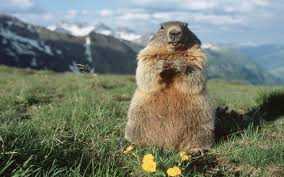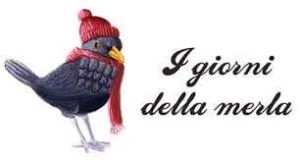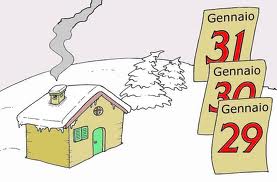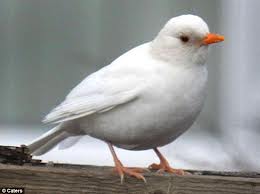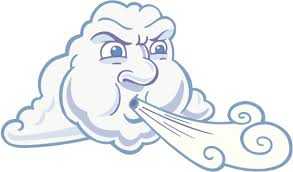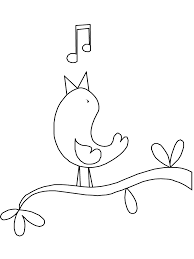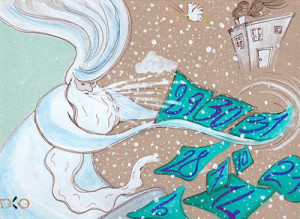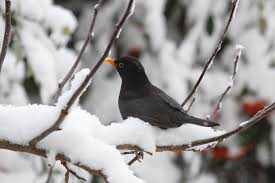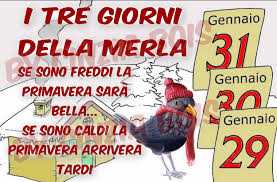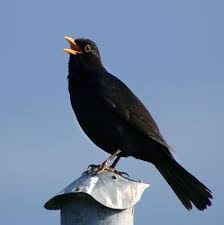Christmas holidays have come and gone, and by the end of January, many of us have had it with cold, gray, rainy or snowy weather. How much more of this and how much longer ’til spring? If you’re in the U.S., you might check in to find out whether the groundhog saw his shadow. In Italy, there’s a similar spring-predicting folklore, and it centers on the humble blackbird, who according to legend, started out white…
Prefer to read this post in English? Skip to the text in green.
I giorni della merla sono il 29, 30, e 31 di gennaio. Secondo la leggenda, se questi giorni sono freddi la primavera sarà bella, e se sono caldi la primavera arriverà tardi. Questo è forse la cosa più vicina nel folclore italiano all’osservanza di Groundhog Day (2 febbraio) negli Stati Uniti, secondo la quale, se la marmotta (the groundhog) vede la sua ombra, l’inverno durerà altre sei settimane. Se invece non vede l’ombra la primavera è in arrivo.
“Blackbird days” are the 29th, 30th and 31st of January. According to legend, if these days are cold, spring will be beautiful, and if they are warm, spring will arrive late. This is perhaps the closest thing in Italian folklore to the observance of Groundhog Day (February 2nd) in the United States, according to which, if the groundhog sees its shadow, winter will last another six weeks. If instead it doesn’t see its shadow, spring is on the way.
La leggenda dei giorni della merla ha le sue radici nei tempi romani quando nel calendario il mese di gennaio ancora conteneva solo 28 giorni. Secondo la storia, una merla, con uno splendido candido piumaggio, veniva regolarmente strapazzata da gennaio, mese freddo e ombroso, che si divertiva ad aspettare che lei uscisse dal nido in cerca di cibo, per gettare sulla terra freddo e gelo.
The legend of “blackbird days” has its roots in Roman times when the calendar month of January still only contained 28 days. According to the story, a blackbird, with her splendid, snow white plumage was usually thrown about by January, a cold and overcast month, who amused himself by waiting for her to leave her nest in search of food, and then casting bitter cold and frost onto the Earth.
Stanca delle continue persecuzioni, la merla un anno decise di fare provviste sufficienti per un mese, e si rinchiuse nella sua tana, al riparo, per tutto il mese di gennaio, che allora aveva solo ventotto giorni. L’ultimo giorno del mese, la merla, pensando di aver ingannato il cattivo gennaio, uscì dal nascondiglio e si mise a cantare per sbeffeggiarlo.
Tired of the ongoing harassment, one year the blackbird decided to gather enough provisions for a month and closed herself in her burrow, taking refuge for the entire month of January, which at the time had only 28 days. The last day of the month, thinking to have outsmarted the wicked January, she left her hideaway and started singing to mock him.
Gennaio se ne risentì così tanto che chiese in prestito tre giorni a febbraio (che allora aveva ancora 31 giorni) e si scatenò con bufere di neve, vento, gelo, e pioggia. La merla si rifugiò in un camino e lì restò al riparo per tre giorni. Quando la merla uscì, era sì salva, ma il suo bel piumaggio si era annerito a causa del fumo e del fuliggine, e malgrado cercava di ripulirsi non ci riusciva.
January took such great offense that he asked February (which then still had 31 days) for a loan of three days, and he went crazy with snow storms, wind, ice, and rain. The blackbird took refuge in a chimney and there she stayed sheltered for three days. When the blackbird came out, she was indeed safe, but her beautiful plumage had blackened from the smoke and soot, and despite her efforts to clean herself up, she wasn’t able.
Il potente gennaio si godette la scena e poi disse con il suo vocione: “Che questo serva da lezione a voi e a tutti gli animali: non si scherza con le stagioni, con il freddo o con il clima. Non ci si può prendere gioco della Natura. Da oggi in poi io (gennaio) avrò 31 giorni e gli ultimi tre giorni saranno i più freddi dell’anno. Per ricordare a tutti questa storia, i merli porteranno per sempre queste piume nere”.
Powerful January was amused by the scene, and then he said in his thundering voice, “ Let this serve as a lesson to you and to all the animals: You don’t joke with the seasons, with the cold or with the climate. You cannot mock Nature. From today forward, I (January) will have 31 days, and the last three will be the coldest of the year. To remind everyone of this story, the blackbirds will forever more bear black feathers.
Well, here where I live, the last three days of January were not very cold, so, I guess that means spring is still long way off… *sigh*. How about the weather where you are? Heard of the “Blackbird days” story before? What’s your take on animal and weather folklore?

